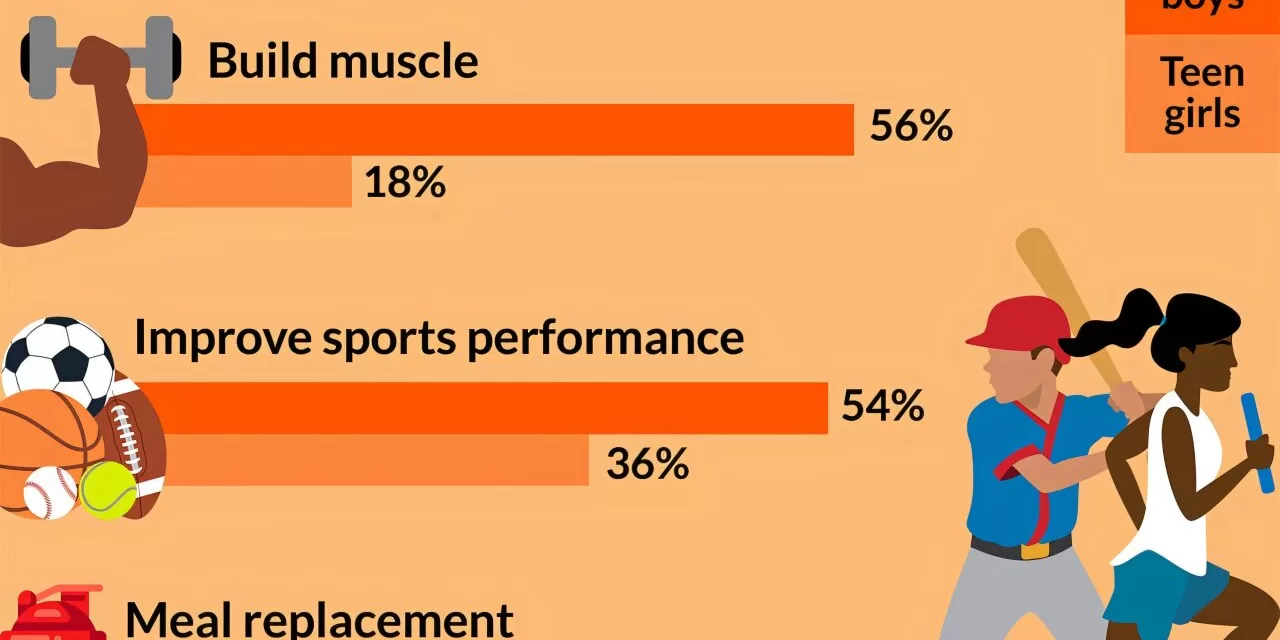In a recent national survey, nearly two in five parents reported that their teenage children consumed protein supplements in the past year. According to the University of Michigan Health C.S. Mott Children’s Hospital National Poll on Children’s Health, protein supplements are becoming increasingly popular among teens, especially boys, who use them to enhance athletic performance and build muscle. The findings highlight a growing trend of adolescents adopting supplements like protein powders, bars, and shakes—products often associated with adult fitness and dieting.
The poll, which included responses from 989 parents of teens aged 13 to 17, revealed that boys were more likely than girls to consume protein supplements, with many using them daily or most days. Boys primarily sought to improve muscle growth and performance in sports, while girls more often used the supplements to replace meals during busy times or to help maintain a balanced diet. However, around one in ten parents reported that their teen used protein supplements for weight loss, a behavior more common among girls.
The Role of Protein in Teens’ Diets
“Protein is part of a healthy diet, but it can be hard for parents to tell if their child is consuming the right amount,” said Sarah Clark, M.P.H., co-director of the Mott Poll. “Our poll highlights that many teens are using protein supplements, particularly protein powders, to improve their athletic performance and build muscle.”
Clark noted that before turning to supplements, it’s important for teens and their parents to consider what they want to achieve. In many cases, a balanced diet can provide sufficient protein, and consulting with a healthcare provider or nutritionist can help determine whether supplements are necessary.
“Despite what some teens—and their parents or coaches—think, eating more protein than what your body needs will not result in larger or faster muscle gains,” Clark explained. “It’s helpful to consume the recommended amount of protein spread throughout the day, at each meal and snack.”
Choosing Healthy Supplements
One challenge many parents face is determining which protein supplements are healthy. “Many protein shakes and bars have excessive amounts of added sugar and caffeine that are unhealthy for teens,” said Clark. She recommended that parents help their teens read labels and opt for products that contain fiber and minimal or no added sugars.
While protein supplements can serve as a convenient option when time is limited, Clark emphasized that they should not replace balanced meals, which provide essential vitamins, minerals, and fiber that teens need for overall health.
Are Teens Getting Enough Protein?
The poll found that nearly one in five parents believed their teen wasn’t getting enough protein from their regular diet. Protein is vital for muscle growth, hormone regulation, and immune health. However, the optimal amount of protein varies depending on the teen’s age, sex, weight, and physical activity level, making it difficult for parents to assess whether their child is getting the right amount.
Clark advised parents to offer protein-rich foods at each meal, such as eggs, lean meats, fish, dairy products, nuts, and lentils. “Teens can generally get enough protein through a well-balanced diet,” she said. “There may be situations where protein shakes or bars can be part of a plan to increase their intake, but they should not be the first choice.”
Parental Influence
Interestingly, the poll also found that parents’ own behaviors regarding protein supplements often influence their children. One in three parents said they use protein supplements themselves, and these parents were more likely to report their teen also used them. Additionally, over half of the parents surveyed believed a high-protein diet was beneficial for their teen.
Clark emphasized that parents should model a balanced approach to nutrition, focusing on whole foods and ensuring that both they and their children are getting a variety of essential nutrients, not just protein. “High protein, low carbohydrate diets are popular among adults, but teens still need carbohydrates and other nutrients for healthy development,” she said.
In conclusion, while protein supplements are becoming more popular among teens, especially for athletic performance and muscle growth, parents should focus on a well-rounded diet and consult with healthcare professionals before turning to supplements. As Clark stated, “It’s better to get enough protein through a balanced diet, and if supplements are necessary, choose products that contain other nutrients, without added sugar or caffeine.”












